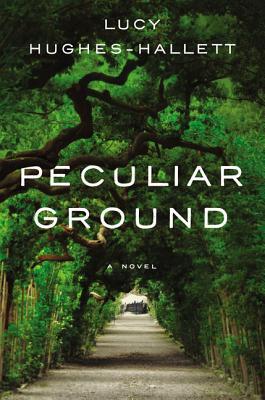Peculiar Ground by Lucy Hughes-Hallett
/Peculiar Ground
by Lucy Hughes-Hallett
Harper, 2018
Lucy Hughes-Hallett comes to the world of fiction after writing nonfiction, including The Pike, a very good book about Italian writer and gold-plated weirdo Gabriele D'Annunzio. Her opulent new book Peculiar Ground, her debut work of fiction, is probably predictably steeped in history, split between two very different eras.
The narrative is grounded in 17th century England, a country where the scars of the Cromwellian interregnum are still fresh, and where newly-returned royalists are still feeling their way in the land they once called home. Arthur Fortescue, the Earl of Woldingham, has returned to his Oxfordshire country estate of Wychwood with his wife and children, and his long-term reaction to his exile in the Hague is a kind of second exile: he engages visionary landscape artist John Norris to enclose the entire estate in five miles of tall wall, sequestering the whole of Woldingham's world:
My task is to create an Eden encompassing the house, so that the garden will be only the innermost chamber of an enclosure so spacious that, for one living within it, the outside world, with its shocks and annoyances, will be but a memory. Other great gentlemen may have their flocks of sheep, their herds of deer, but, should they wish to control those creatures' movements, a thorny, hedge or palisade of wattle suffices. Lord Woldingham's creatures will live within a confined within an impassable barricade. As for human visitors, they will come and go only through the four gates, over which the lodge-keepers will keep vigil.
Norris is the reader stand-in for the events in the book's beguiling opening sections, in which the hapless landscape artist is ensnared in Woldingham family politics, falls in love, and stumbles into country-magic rituals that only seem to grow darker as the wall rises. Hughes-Hallett is an experienced hand at bringing the past to life for her readers, and the opening section of her book breathes with the tensions and fears underlying life in Restoration England.
Then the time shifts; readers are brought from the early 1660s to the early 1960s. Rather ham-handedly, there's also a rising wall at the center of events, this time the Berlin Wall. Wood Manor, on the old baroquely-sculpted Wychwood grounds, is now run by agents and proprietors, with louche, aristocratic guests drifting in and out. The world is suddenly rarefied, but in a very different, very Brideshead Revisited kind of way:
So that August weekend at Wychwood had the kind of languor to it of a siesta before a taxing evening. Soon there would be sleeper-cars and sport and then – for some of the house-party – the brisk back-to-work of September. But we were still in the season of moving like somnolent dogs from one patch of shade to another. Iced coffee under the cedar tree. Picnic tea down by the upper lake in the hideous pagoda of which Christopher's father had been so proud. Long afternoon hours when it seemed as though everyone had vanished, when the only living beings announcing their presence were the peacocks with their yearning cries.
There's some taut plotting in the 1960s portions of the novel, but not so much that you'd notice it if you didn't go looking for it. It's a curious harsh-stepped drop from the Restoration section that opens the book; the knotted grief and inspiration of Lord Woldingham's walled-off world is hypnotic, and even Hughes-Hallett's diction complicates and deepens in vividly memorable ways when it's describing Norris' journey into unexpected crises. Wychwood is in these pages a grippingly disturbed place; surely most readers will want to stay there and look warily at the change of time period that comes fairly early on. Hughes-Hallett knows all about reader expectations; she must have known that the only effective way to counter that reluctance is to make the 1960s sections every bit as gripping, but this virtually never happens. Instead, the long 20th century portion of the narrative strains for the kind of effectiveness that the opening Restoration portion seemed to achieve effortlessly. The diction changes in the modern era, becoming more sentimental with less warrant; the nature of the characters changes – their passions dim, and they seem to be less interested in their world; even Hughes-Hallett's own authorial attention seems to slacken – phrases are repeated with apparent negligence, the story meanders, and a key detail of one character's sub-plot is raised and then seems to be forgotten.
It's possible that all of this could be serving a larger purpose – indeed, maybe probable, since the alternative is that a writer this skilled and experienced was somehow unaware of the badly lopsided nature of her own narrative; it's possible that Hughes-Hallett intends to underscore for the reader a theme of attenuation. That, too, would be familiar Brideshead territory, and it's possible Peculiar Ground will find an equally loyal readership outside of Wychwood's walls.
Steve Donoghue was a founding editor of Open Letters Monthly. His book criticism has appeared in the Boston Globe, the Wall Street Journal, and the American Conservative. He writes regularly for the National, the Washington Post, the Vineyard Gazette, and the Christian Science Monitor. His website is http://www.stevedonoghue.com.
